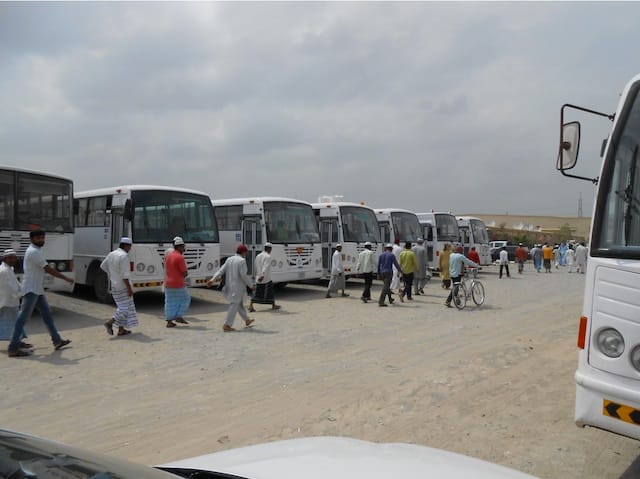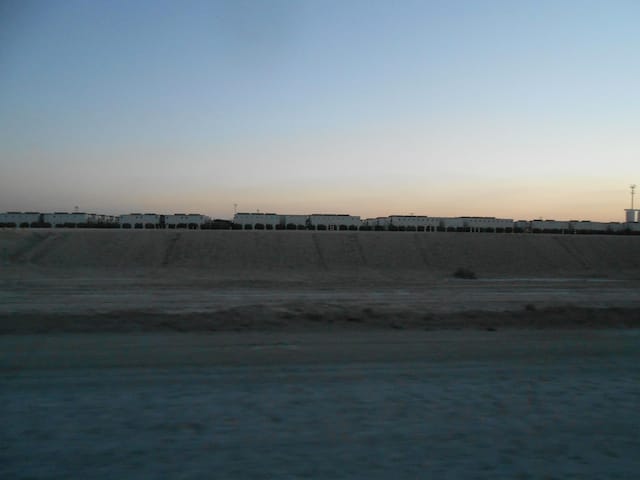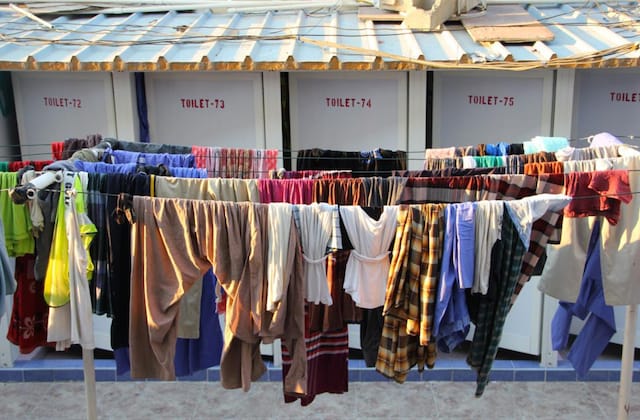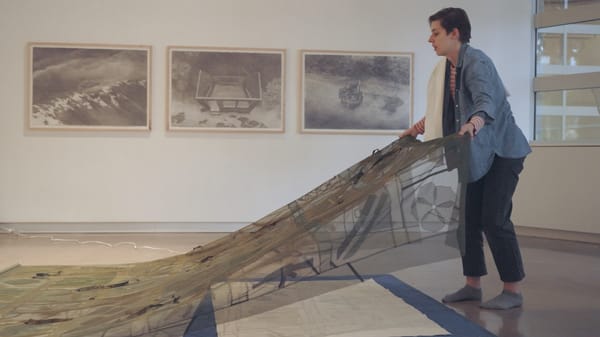Gulf Labor Monitoring Report Finds Ongoing Violations at Guggenheim Abu Dhabi
A report released this morning by Gulf Labor, a coalition of international artists, confirms the ongoing violation of local and international labor laws at the site of the Guggenheim Abu Dhabi, Louvre Abu Dhabi, and Zayed National Museum, among other institutions.

A report released this morning by Gulf Labor, a coalition of international artists, confirms the ongoing violation of local and international labor laws at the site of the Guggenheim Abu Dhabi, Louvre Abu Dhabi, and Zayed National Museum, among other institutions. The group’s findings are the result of a visit to Saadiyat Island in March, where they were invited by the emirate’s Tourism and Development & Investment Company (TDIC) to observe labor conditions on the site of the planned museum district. The report follows the release in late December of the second official “monitoring” report, commissioned by the emirate from the PricewaterhouseCoopers (PwC) consultancy and previously criticized as inadequate by Gulf Labor.
The release aims to reframe the narrative surrounding the “model” Saadiyat Accommodation Village (SAV) constructed in 2009, a facility frequently cited to defuse criticism of labor conditions — despite its housing only a fraction of Saadiyat Island’s workforce. Gulf Labor observes that although the SAV is indeed an exemplary, albeit geographically isolated, facility, with amenities “rarely seen in accommodations for migrant workers,” this cosmetic success belies significant violations of workers’ rights.
Chief among these: wages remain very low, with the “twenty or so” workers they met earning basic monthly salaries of 650–900 AED ($177–245); rampant recruitment debts, caused by fees that TDIC officially requires be reimbursed, that effectively place workers in indentured servitude (one Bangladeshi worker is cited as still not having this debt repaid after two years); organizing and collective bargaining remains strictly forbidden, with punishments like mass deportation provoking bloody clashes last summer; workers continue to have their passports withheld by employers.

Worker feedback on the SAV facilities is allegedly inadequately dealt with as well, with reported bathroom leaks left unrepaired; a hotline set up for complaints does not result in “immediate feedback,” according to Gulf Labor’s sources. The group further found that companies housing workers in the SAV pay TDIC more in fees than they pay the workers in wages, fueling the argument that such accommodations serve a public relations function more than they accrue a direct benefit to workers. Guidelines posted within the dormitory spaces list prohibited items and practices: “eating, cooking, washing and drying, drinking alcohol, and pornography.”
In meetings with TDIC following their observations on Saadiyat, the Gulf Labor group proposed a number of recommendations, including a one-time “relocation fee” paid out to those working on the Guggenheim Abu Dhabi to defray illegal debts to recruitment agencies. A broader solution to the issue of undocumented and unrepaid recruitment fees, Gulf Labor adds, would be to more rigorously assess each contractor’s practices to ensure compliance with existing policies as well as conduct a comprehensive survey “of the recruitment and relocation histories of all workers at SAV immediately.” The group further proposes the involvement of the International Labor Organization, a United Nations agency concerned with labor rights, in ensuring reforms are implemented.
“When we talk to labor and migration policy experts, they tell us that these issues are not intractable but eminently and imminently fixable,” Gulf Labor’s Walid Raad told Hyperallergic in an email. “Our own conversations with workers, on-site visits, and this report also prove the same. We hope that the Guggenheim, TDIC, and the UAE Ministry of Labor will soon start talking with folks who can actually solve these issues and not simply spin masters (whether working for the Guggenheim or TDIC) who simply wish to remind us of how ‘intractable’ and ‘complex’ they are.”

Indeed, nearly all of the labor issues documented have been raised before, including by Gulf Labor, but they have been either ignored or neutralized by PR — ranging from TDIC assurances to Guggenheim shrugs. During the course of their March visit, Gulf Labor itself only met with PR officials from TDIC. As Walid Raad explains:
In our visit, TDIC used the word “partner” time and again. They stated they wish for a “partnership.” But it is also clear to us that we have been talking only to PR folks. We have yet to talk to any of TDIC’s “labor experts” — and we are assured by the PR folks that they are within TDIC and working to solve these issues.
The very structure of the “independent” monitoring that TDIC has hired PwC to carry out is seriously compromised by the firm’s extensive business ties to the country. This has previously been noted by Gulf Labor and others, but the systems for diffusing responsibility have clearly been set into motion — the PwC report issued this year announced the addition of yet another layer between alleged violations and their reporting to the state entity, TDIC, ultimately responsible for the Saadiyat project:
During April 2013, TDIC undertook a restructuring initiative which resulted in TDIC moving to an outsourced model with respect to maintaining H&S [Health & Safety] management and monitoring of Contractors and Subcontractors. A [unnamed] third party service provider has been contracted to undertake H&S management and monitoring on TDIC’s behalf.
In an editorial yesterday, the English-language The National (a newspaper published by state-owned Abu Dhabi Media) argued that the “great museums” being built on Saadiyat will invariably attract “sniping” criticism. After citing the artifacts accumulated by the Louvre under French empire as an example of the apparent ethical ambiguity inherent to museum collections, the article concludes: “Maybe we ought to take this sniping as a good thing. The worst sin of any cultural facility is to be ignored.”
The Guggenheim and TDIC have been made aware of the report; any public statements will be appended here as they appear.
Update, 4:59pm: The Guggenheim has provided the following statement to Hyperallergic:
We appreciate the research and recommendations and look forward to detailed discussions with Gulf Labor and our colleagues in Abu Dhabi about next steps once we have had time for careful consideration of the report.




